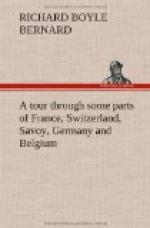“That which is best administered is best.”
The form is still in my judgment the first requisite; nor can I agree that the goodness consists in the mere administration. I visited the agricultural establishment of M. de Fellenberg, at Hofwyl, two leagues from Berne, where may be learnt the principles of rural economy, and where annual fetes are given for the encouragement of farming; and I also made an excursion to Hindelbanck, three leagues distant, where is a much admired monument, erected from a design of M. Nahl; it represents his wife, who died in child-bed, breaking; from her tomb with her child in her arms. The Canton of Berne, before the separation from it of the Cantons of Vaud and Argovia, formed about a third of Switzerland; its population is now about 300,000. The country is fruitful, but like the rest of Switzerland does not afford a sufficient supply of corn for its inhabitants. Its fruit and vegetables are excellent. Its mountains feed vast herds of cattle, and there is abundance of game. Its exports are principally horses, cottons, watches, and kirschwasser, (or spirit extracted from the cherry) there are manufactories of silks, and woollen stuffs, and its gunpowder is in much estimation throughout Europe. The salt comes mostly from France, but does not cost above five sols the pound. Groceries are still dear, but are much reduced since the downfall of the continental system. This Canton first entered into the Swiss Confederation, in 1353. I made some enquiries respecting clergy, from a most respectable minister of my acquaintance, who informed me, that the senate appoint to all ecclesiastical benefices—that the clergy are divided into synods which assemble separately every year under the presidency of a Dean, to examine into the conduct of each pastor, and to deliberate in the presence of the Bailiff of the District, concerning ecclesiastical affairs. The criminal code is well arranged, and justice is administered with a promptitude that merits the highest praise, since legal delay often proves worse than injustice.
I was doubtful in what direction I should next proceed, when I was induced, as the season was advanced, to give up the idea of visiting Oberland, and to accompany a gentleman going to Lucerne; if the country was less romantic than that which I lost the opportunity of seeing, I was with a companion who would have rendered an excursion in any country entertaining. We left Berne in an open carriage, and took the road to




